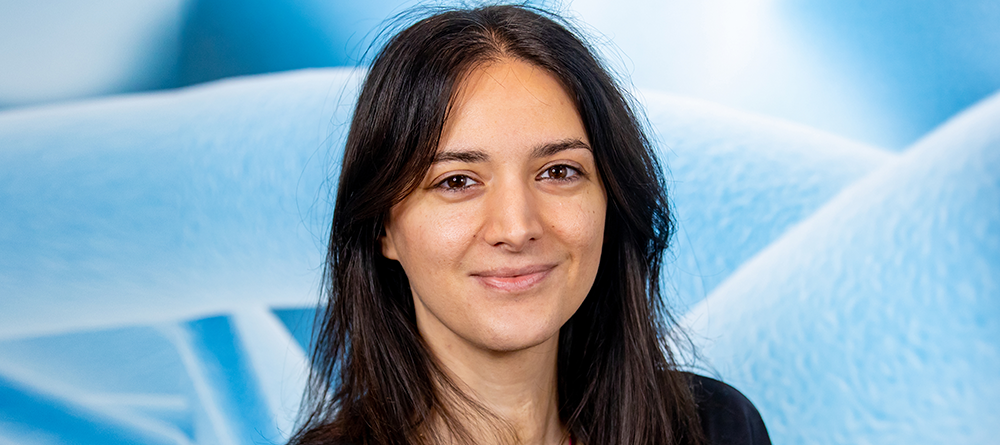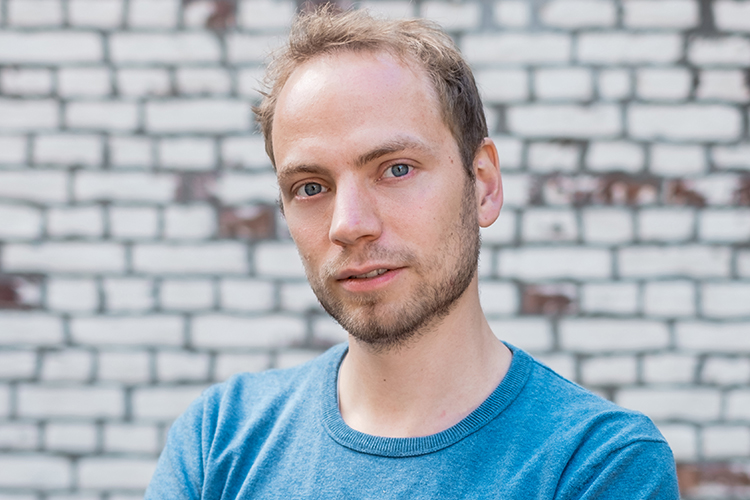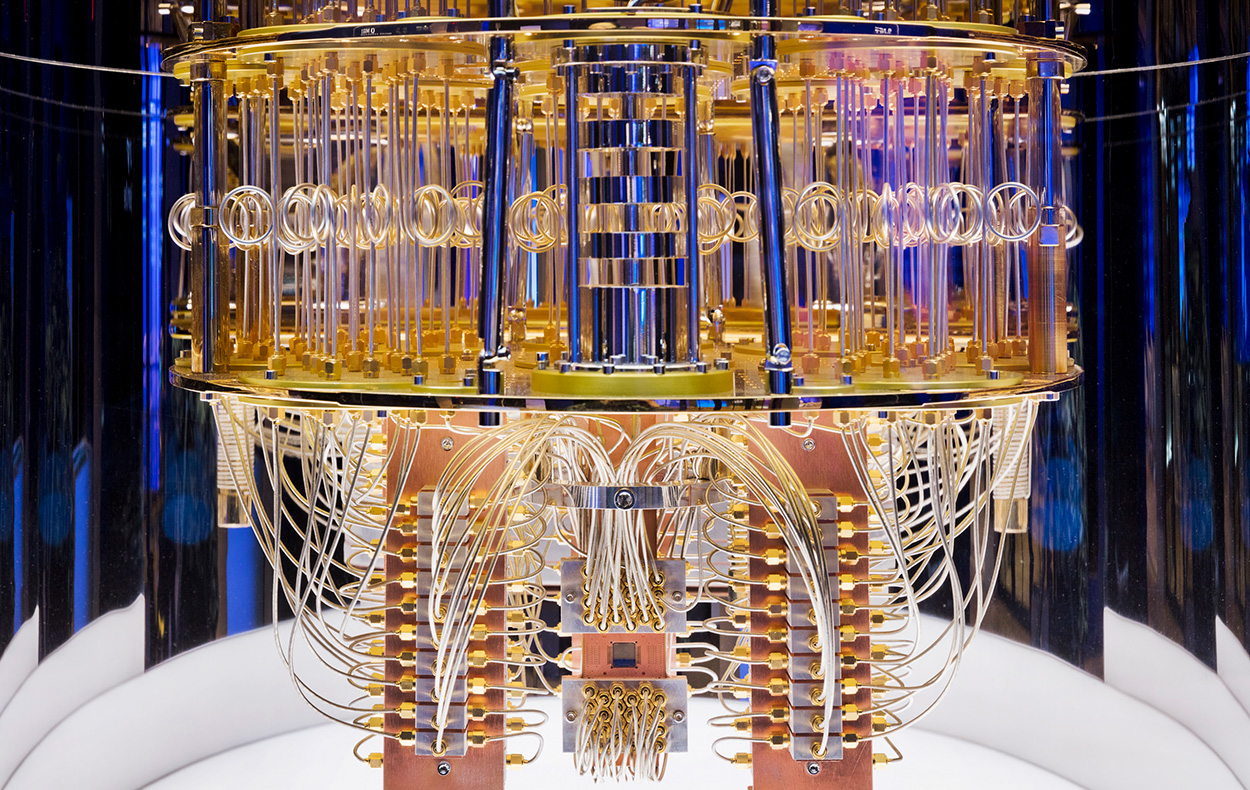What is Quantum?
Atoms and smaller elementary particles behave in unusual, sometimes unpredictable ways. It sounds strange, but it is this unpredictability that gives a quantum computer its power. Executing precise calculations with previously unheard-of possibilities in a way that physicists still do not completely comprehend: welcome to the world of the quantum computer.
All things in our environment are tangible, observable, and subject to the laws of physics. Newton's classical law of gravity, for instance, exactly predicts how an apple will fall from a tree. A closer look at the apple reveals ever-tinier components, including a seed, cells, and molecules. These components still adhere to the classical laws of nature. However, an odd thing occurs if you zoom in to the level of atoms and elementary particles: the behaviour of the particles is no longer described by the classical laws. The smallest particles appear to be treated differently by nature than the larger ones.
Different behaviour
"Imagine you have a wall with a hole in it and a ball larger than the hole. Every time you toss the ball at the hole, it bounces back. If you take a smaller ball, you suddenly see different behaviour; the ball can fly through the hole." Jacco de Vries tries to explain the difference in behaviour between large and small particles. Jacco is a physicist and elementary particle researcher with the Gravitational Waves and Fundamental Physics research group. So, what is unique about the behaviour of tiny particles? Well, you can no longer accurately identify all he characteristics of the smallest particles. For instance, you cannot pin them to one position in space; at best, you can estimate where they are.
Superposition
Other characteristics of particles in the quantum world are also uncertain. For example, a particle can rotate left or right on its axis, but if you do not look at how it rotates, it moves both left and right at the same time, according to the laws of quantum mechanics. Physicists refer to this phenomenon as superposition. Such features may appear weird, but they are real. Researchers generate superpositions and observe their effects. The latter is critical for the operation of a quantum computer.
Quantum Computing Series
Quantum computers are bringing about the greatest technological breakthrough of this century, or so the promise goes. However, what is quantum, and what are quantum computers? What are the possibilities for using them? In addition, how does one programme a quantum computer? The answers to these questions are explored throughout this collection of five stories. The focus is primarily on the University of Maastricht's speciality, Quantum Computing, which entails programming quantum computers.
- What is Quantum?
- What is Quantum Computing?
- Quantum Computing research
- Education on Quantum Computing
- Quantum Computing Community

If your brain is spinning right now, do not panic; you are not alone. "We know superposition exists and can experiment with it, but we do not really understand how the underlying physical principals work," says Menica Dibenedetto, a physicist working in Quantum Artificial intelligence at the Department of Advanced Computing Sciences.

Qbits
A traditional computer operates on semiconductors, which may or may not conduct electricity. If they conduct electricity, we assign them a value of one; otherwise, we assign them a value of zero. Here are the well-known bits, 0 and 1, that a classical computer uses to calculate. A quantum computer also makes use of the uncertainty that comes with quantum mechanics, which allows particles to be both 0 and 1 at the same time. At first glance, such a quantum bit (qbit) appears to provide three computation options: 0, 1, and 0/1. That turns out to be a big understatement. Jacco: "While a qbit is in superposition, the chance of the qbit being 1 can have any value between 0 and 100%; thus, a superposition gives you an enormous number of options. A quantum computer can calculate the square roots of the numbers 1 to 100 thousand by providing all these numbers in a single superposition. A task that a classical computer would have to do number by number.”
Jacco's example demonstrates that a quantum computer can work considerably faster than a traditional one, but Menica believes that Quantum Computing offers more equally important advantages: "You can process your data in ways that are not possible with a classical computer." The upcoming Einstein Telescope for measuring gravitational waves is one example of this. "The telescope can observe 100,000 overlapping signals at once. A traditional computer cannot separate these signals. We are developing an algorithm for a quantum computer that might be able to accomplish this."
Hardware
The algorithms and software for quantum computers are already available, but what about the hardware? "Several experimental quantum computers are operational," stated Jacco. "Yet there are still many challenges to overcome before they can fulfil their promises. There are two primary challenges in the technical field. First and foremost, a quantum computer is extremely sensitive to errors, and those errors accumulate, limiting the number of calculations possible before the result becomes unreliable. Second, current quantum computers use only a few qbits, whereas you would prefer to use hundreds or thousands.
Entanglement
Next to superposition, quantum computers can make calculations using a second phenomenon from the realm of quantum mechanics; quantum entanglement
- Superposition is when a qubit is not just in the state 0 or 1, but in a combined state of both 0 and 1 simultaneously.
- Entanglement occurs when two qubits are in superposition states and are linked in such a way that the state of one qubit instantly determines the state of the other. For example, if one qubit is measured to be 0, the other qubit will be 1, and vice versa.

In addition, there are three challenges in the field of quantum computing: how to feed data to a quantum computer, how to create algorithms, and how to collect the results. Jacco on the last one, collecting the results: "Consider the example of taking square roots of 100,000 numbers simultaneously. With current techniques, you only get one random answer while missing the other 99,999 possibilities. We will have to find a solution for that."
Menica is optimistic about the future of quantum computing: "You see that companies, despite the uncertainties, continue to develop the technology and even profit from it. Quantum computers gained popularity in recent years, but the research has been ongoing for decades. There is no guarantee that an error-free quantum computer will exist in ten years, but research into quantum computers provides us with far more knowledge than about that computer alone. It forces us to look at everyday problems in a completely new light, so we can address them with a future quantum computer.
The next episode in this series will be about quantum computing.
Quanta
If you heat a glass of water from room temperature to 80 degrees Celsius, it will reach any temperature in between until the ultimate temperature is reached. The energy you provide heats the water continuously and without interruption, completely following the rules of classical mechanics. This concept of continuity does not exist in quantum mechanics. An object has properties that come in packets, such as packets of energy. Quantum mechanics limits the energies that a particle can have. Energy values in between are simply impossible. That is why quantum mechanics refers to quanta, or packets.
